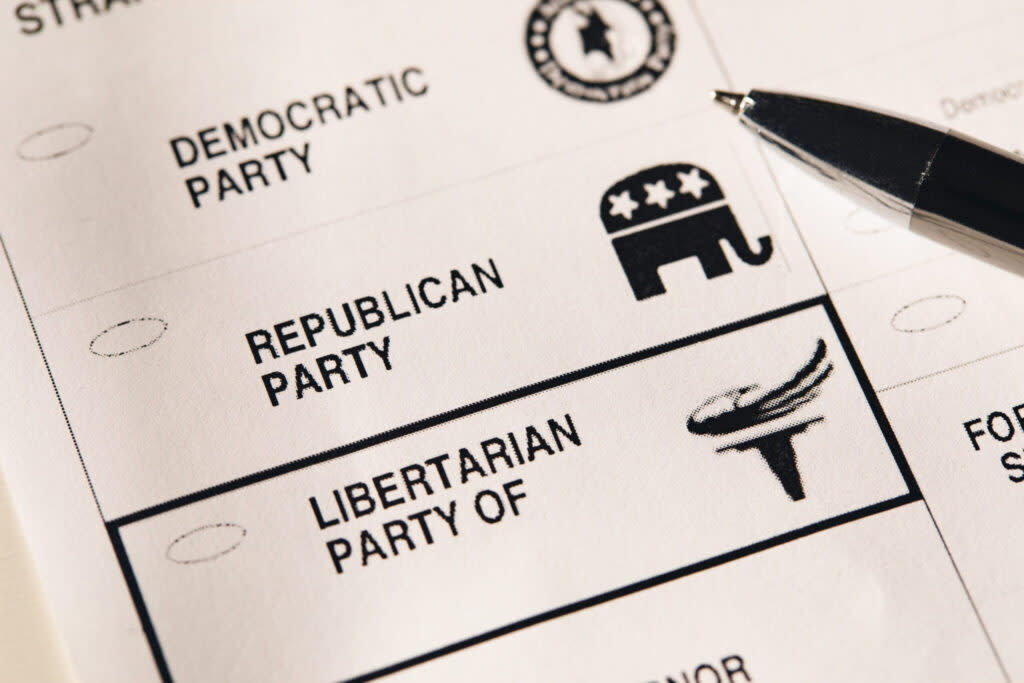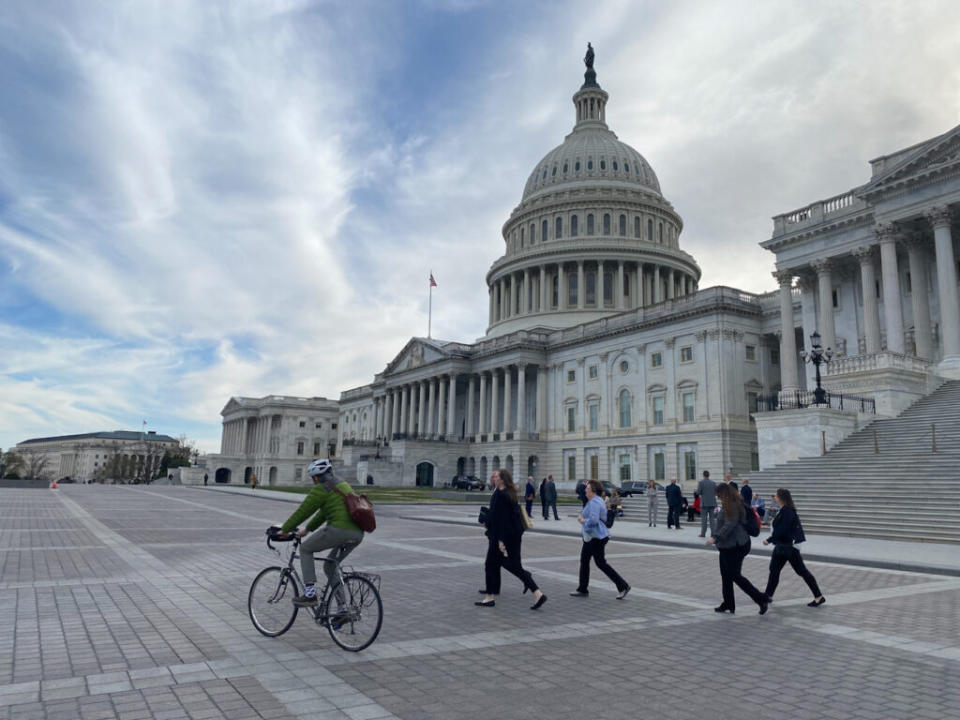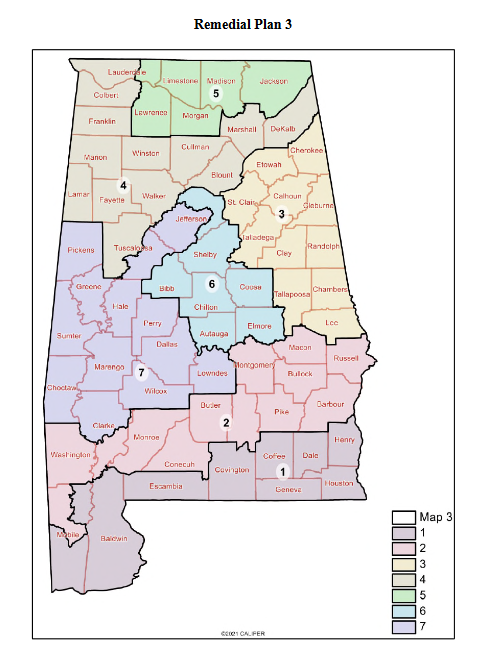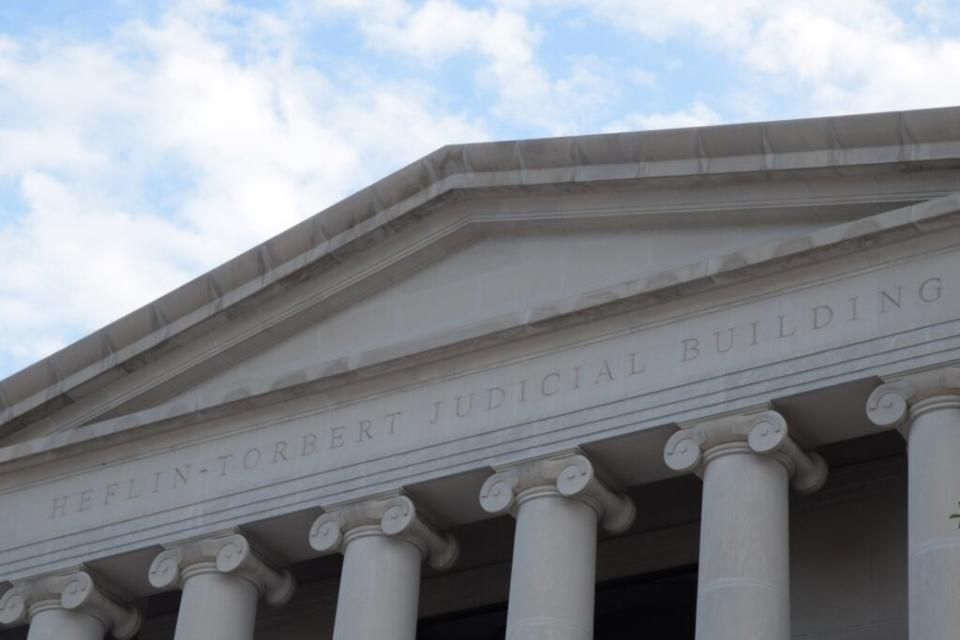Your guide to Tuesday’s primaries in Alabama

A voting ballot. (Getty Images)
Alabama voters go to the polls today to select Democratic and Republican nominees for state and federal offices. Below is a brief guide to the races.
When are polls open in Alabama?
Polls are open from 7 a.m. to 7 p.m. You can find your polling place and registration status here.
What do I need to vote?
Voters must present a valid photo ID before voting. Valid forms of ID include:
Alabama driver’s license (not expired or expired less than 60 days)
Alabama Law Enforcement Agency digital driver’s license
Alabama Non-Driver ID (not expired or expired less than 60 days)
Alabama Photo Voter ID card
State-issued ID (Alabama or any other state)
Federal-issued ID
U.S. Passport
Employee ID from the federal government; state of Alabama; county; municipality, board or other entity of Alabama
Student or employee ID from a public or private post-secondary educational institution in Alabama or other states (including colleges, universities, postgraduate technical and professional schools)
Digital student or employee ID from a public or private post-secondary educational institution in Alabama or other states (including colleges, universities, postgraduate technical and professional schools)
Military ID
Tribal ID
GET THE MORNING HEADLINES DELIVERED TO YOUR INBOX
What federal races are on the ballot?
The U.S. Senate early Tuesday passed legislation extending global military and humanitarian assistance to Ukraine, Israel and Taiwan. Senators earlier blocked a sweeping larger package that would have overhauled immigration law for the first time in decades.(Jennifer Shutt/States Newsroom)
The presidential race, for one. Democrats will choose between incumbent President Joe Biden and challenger Dean Phillips, a congressman from Minnesota. Republicans will choose among seven candidates, though only three – former President Donald Trump; former South Carolina Gov. Nikki Haley and Florida businessman David Stuckenberg – have active campaigns.
The only congressional race without at least one competitive primary is the 5th Congressional District, where U.S. Rep. Dale Strong, R-Madison, is running unopposed for re-election. A federal court ruling that redrew the state’s map last fall has had a major effect on at least two races.
A federal court last October ordered Alabama to adopt this congressional map for the March primaries. (U.S. 11th Circuit Court of Appeals)
1st Congressional District: U.S. Reps. Jerry Carl, R-Mobile, and Barry Moore, R-Enterprise are seeking the Republican nomination in the district, redrawn after the federal court ruling by adding the Wiregrass portions of the former 2nd Congressional District (which Moore currently represents) to the Mobile-centered 1st Congressional District. The winner will face presumptive Democratic nominee Tom Holmes in November.
2nd Congressional District: Eighteen candidates – 11 Democrats and seven Republicans – are running for the redrawn seat, meant to be an “opportunity” district for Black voters to select their preferred candidates. The seat should lean Democratic in November and could draw national attention with control of the U.S. House at stake.
3rd Congressional District: U.S. Rep. Mike Rogers, R-Saks, first elected to the U.S. House in 2002, faces Republican challengers Barron Bevels and Bryan Newell in the GOP primary. No Democrat qualified for the race.
4th Congressional District: U.S. Rep. Robert Aderholt, R-Haleyville, first elected in 1996, faces a Republican primary challenge from Justin Holcomb, a former spokesman for the Oklahoma State Department of Education. No Democrat qualified for the race.
6th Congressional District: U.S. Gary Palmer, R-Hoover, first elected in 2014, faces a primary challenge from Ken McFeeters, an insurance agency owner, and Gerrick Wilkins, a businessman. The winner will face presumptive Democratic nominee Elizabeth Anderson.
7th Congressional District: U.S. Rep. Terri Sewell, D-Birmingham, first elected in 2010, faces a primary challenge from Chris Davis. Republican candidates Robin Litaker, a claims adjuster, and Christian Horn, a Republican candidate for secretary of state in 2022, are on the GOP ballot.
What state races are on the ballot?
The Heflin-Torbert Judicial Building in downtown Montgomery, Alabama, seen on January 24, 2023. The building houses the Alabama Supreme Court and the state appellate courts. (Brian Lyman/Alabama Reflector)
Alabama elects most of its state officers in the off-year of presidential elections, and the big races there will be in 2026. But there are several contested judicial and state school board races.
Chief justice: Alabama Supreme Court Justice Sarah Stewart and former Sen. Bryan Taylor are seeking the Republican nomination to replace incumbent Tom Parker, who is past the state’s mandatory retirement age. The race has taken on a new profile since the court on Feb. 16 ruled that frozen embryos are children, leading to a halt to in vitro fertilization programs in the state.
Stewart, who joined the majority opinion in the case, declined to comment on it, citing the ongoing litigation. Taylor wrote in a statement on X, formerly Twitter, that “we can uphold the sanctity of life without subject IVF clinics to lawsuit abuse.”
The winner will face Democratic nominee Greg Griffin, currently a Montgomery County circuit judge. (Griffin’s son, also named Greg Griffin, is running for a circuit court seat in Montgomery.)
State Board of Education: Republicans have two contests to replace two outgoing incumbents. Democrats did not field candidates in either race.
In State Board of Education District 3, taking in much of central Alabama between Birmingham and Montgomery, three Republicans – retiree and conservative activist Ann Eubank; former Rep. Charlotte Meadows of Montgomery, and business executive Kelly Mooney are running to replace longtime incumbent Stephanie Bell, who is stepping down this year. (Former Montgomery County Board of Education member Melissa Snowden, whose name will be on the ballot, said Monday she has “decided to withdraw my name” from the race.)
In State Board of Education District 7, which covers northwest Alabama down to Jefferson County, three candidates — Decatur City Board of Education member Doug Bacchuss; Alan Long, a physician, and Jefferson County Board of Education member Oscar Mann — are running for the seat. The candidates are running to replace Belinda McRae, who is not seeking re-election.
Public Service Commission: PSC President Twinkle Andress Cavanaugh, a Republican, is seeking a fourth term as president. She faces Robert McCollum, a 2022 Republican PSC candidate, in the primary.
What’s this amendment we’re voting on?
The Alabama House of Representatives votes for a bill extending immunity to IVF providers on Feb. 29, 2024 at the Alabama Statehouse in Montgomery, Alabama. The Alabama Legislature is voting on immunity measures after an Alabama Supreme Court decision that caused many IVF programs in the state to close. (Brian Lyman/Alabama Reflector)
Currently, the Alabama Constitution forbids the Legislature from considering any bill before it approves the state’s two budgets. Since the budgets are rarely passed before the final days of the session, the 1984 amendment that created the restriction allows bills to come to floor votes if 60% of lawmakers present and voting agree. That’s known as a budget isolation resolution (BIR).
The provision effectively requires every bill to win a supermajority vote to pass. The amendment on Tuesday’s ballot would remove the BIR from local legislation, or bills specifically for a city or county, and aims to make it easier to get those bills into law. Statewide bills would retain the BIR.
The post Your guide to Tuesday’s primaries in Alabama appeared first on Alabama Reflector.





